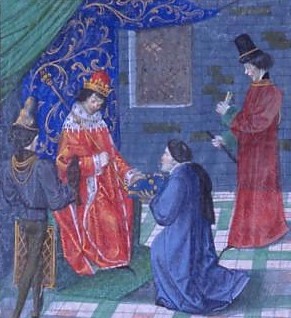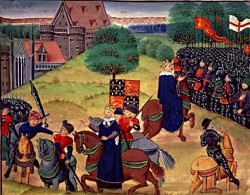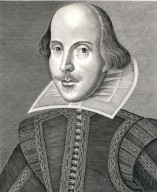Aesthetic Realism Lecture
“Richard II and Anger” by Eli Siegel, 3rd Lecture
The Nevertheless Poetry Club, February 24, 1971
Report by Anne Fielding
 Eli Siegel’s three-part discussion on Richard II has given us a new picture of the Shakespearean king and a new way of seeing the play. The anger, despair, pomp and ordinary human feeling of Richard II have been given a coherence through Eli Siegel's criticism. The play lives in a new way.
Eli Siegel’s three-part discussion on Richard II has given us a new picture of the Shakespearean king and a new way of seeing the play. The anger, despair, pomp and ordinary human feeling of Richard II have been given a coherence through Eli Siegel's criticism. The play lives in a new way.
We have reached Act 3, Scene 4. Much has happened. Richard II, vain and selfish, felt he could have his own way with England. But he has returned from wars in Ireland to find that the people, including the nobles, have turned against him. His rival, Henry Bolingbroke, is now in power, and Richard, defeated, is in London as a prisoner.
The scene, Westminster. Richard has been summoned to appear before Bolingbroke:
Richard: Alack, why am I sent for to a king
Before I have shook off the regal thoughts
Wherewith I reigned?
King Richard, said Mr. Siegel, has so many ways of showing sadness and complaining about how the world is:
Richard: To do what service am I sent for hither?
York: The resignation of thy state and crown
To Henry Bolingbroke.
Richard: Give me the crown. Here, cousin, seize the crown.
That, said Siegel, is one of the most decisive lines in all drama. In a different way it is as decisive, though not as poetic, as Cleopatra’s:
Give me my robe, put on my crown, I have
Immortal longings in me.
The Unconscious in Conflict
And then we have what Siegel said is a fairly good description of the unconscious in conflict:
Richard: Now is this golden crown like a deep well,
That owes two buckets, filling one another,
The emptier ever dancing in the air,
The other down, unseen, and full of water,
That bucket down, and full of tears, am I,
Drinking my griefs, whilst you mount up on high.
The Duke of Northumberland asks him to read and sign:
These accusations, and these grievous crimes,
Committed by your person, and your followers,
Against the state and profit of this land.
Richard: Must I do so? And must I ravel out
My weaved up follies?
This line and a half has remained, commented Mr. Siegel, as one of the high points of English poetry. It was greatly liked by Sir Walter Scott. It is poetically charming.

Must I do so? And must I ravel out
My weaved up follies?
There is a need of being clear about whatever was wrong in one's life. As life goes on, said Siegel, things get more twisted and tangled, and one doesn't know where one thing ends and another begins. Life, he continued, has been called “needle work in the dark"; "knitting while asleep."
After giving up the crown, Richard asks for a looking-glass:
That it may show me what a face I have
This shows the desire, suggested Mr. Siegel, somewhat like the desire of Dorian Gray, to see what he looks like. And he says:
Was this face the face
That every day under his household roof,
Did keep ten thousand men? Was this the face
That like the sun did make beholders wink?
Here, it was pointed out, Richard talks a little like King Lear remembering his many attendants, and like Dr. Faustus, when he says: "Is this the face that launched a thousand ships?"
Richard dashes the mirror to the ground and says:
Richard: How soon my sorrow hath destroyed my face.
Bolingbroke: The shadow of your sorrow hath destroyed
The shadow of your face.
Richard: Say that again.
The shadow of my sorrow—ha, let's see:
‘Tis very true, my grief lies all within;
And these external manners of laments
Are merely shadows to the unseen grief
That swells with silence in the tortured soul.
That, commented Mr. Siegel, is the second greatest line in this section of the play:
That swells with silence in the tortured soul.
And as Richard is taken away to the Tower of London, Bolingbroke prepares for his own coronation.
The Poetry of Defeat
Two of the persons of the play who continue to care for Richard are the Duke and Duchess of York—even though, as the Duke asserts, “To Bolingbroke are we sworn subjects now.” In Act 5, Scene 2, the Duke of York relates one of the most famous events in Shakespeare and in history—how Bolingbroke was welcomed by the people as he rode through the streets of London, and how Richard, following after him was reviled:
Duchess of York: Alack, poor Richard, where rode he the whilst?
Duke of York: As in a theatre, the eyes of men,
After a well-graced actor leaves the stage,
Are idly bent on him that enters next,
Thinking his prattle to be tedious;
Even so, or with much more contempt, men's eyes
Did scowl on gentle Richard; no man cried 'God save him!'
No joyful tongue gave him his welcome home:
But dust was thrown upon his sacred head:
Which with such gentle sorrow he shook off,
This passage, said Mr. Siegel, was praised in an early criticism of Shakespeare—John Dryden in his Preface to Troilus and Cressida of 1679. It is, said Siegel, poetry of defeat.
Humor and Terror
As we approach the conclusion of the play, there is one of the most interesting quarrels of father, mother, and son. Aumerle, the son of the Duke and Duchess of York, is in a conspiracy to overthrow Bolingbroke, and restore Richard to the throne. When the Duke discovers the plot, he is enraged, and shouts at his son:
Duke: Treason, foul treason, Villain, traitor, slave!
Bring me my boots, I will unto the King.
Duchess: Why York What wilt thou do?
Wilt thou not hide the trespass of thine own?
Duke: Away, fond woman, were he twenty times my son,
I would appeach him.
And all three of them ride to London—separately; the Duke to tell that his son is a traitor; the Duchess to plead for her son's life, and the son to make sure his mother gets in first and that the door is locked so that his father cannot enter. The scene can be called, said Mr. Siegel, the locked and unlocked door scene. It is humorous, but terrifying. In explaining why the scene is placed here, Mr. Siegel suggested that Shakespeare was very much aware that the way a person sees his father and mother affects him very much. Whenever affection changes into hate, he said, it's terrible. When a child sees father and mother quarrel it's his first invitation to leave the world. And this matter has much to do with Richard II and how he saw the world. In the play, the scene ends happily with Bolingbroke pardoning Aumerle.
We have come to the end of the play. Bolingbroke has hinted that he would like to have Richard out of the way. And Richard, in prison, talks about himself, thoughts, and time:
I wasted time and now doth time waste me.
It is one of the longest scenes in Shakespeare; “a blank verse dithyramb to inconstancy,” said Mr. Siegel. “He now has a sense of untrue time which he didn't have before.”
And then, in his cell, Richard is murdered, and his body taken to Bolingbroke, who though he wished Richard dead, now says he is angry with the man who killed him:
. . .though I did wish him dead,
I hate the murderer, love him murdered.
. . .
Lords, I protest, my soul is full of woe,
That blood should sprinkle me to make me grow:
. . .
I'll make a voyage to the Holy Land,
To wash this blood off from my guilty hand:
March sadly after; grace my mournings here;
In weeping after this untimely bier.
And Bolingbroke becomes Henry IV.

The play, said Mr. Siegel, is well-made. The relation of scene to scene is good. The music is a music of ordinary feeling and uncertainty that uses the crown of England to show itself with.
And he concluded: Richard II is about two things; wretchedness and the pomp of the world; anger and the mystery of all reality.